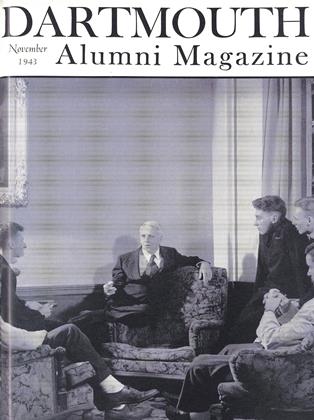IT HAS BEEN some little time since I have written a "browsing" column, but here are a few books I have enjoyed with brief notes about them.
I think you will enjoy Etta Shiber's ParisUnderground published by Charles Scribner's Sons. The author returned on the Drottningholm not as an official, nor as a newspaperwoman, but as an exchanged prisoner of war. She had been guilty of helping a couple of hundred Englishmen escape the Germans in France. We have had a lot of books dealing with the German occupation of France. Here is one of the best, and it makes exciting reading.
You have probably read by now J. P. Marquand's So Little Time, Little, Brown & Co., but if not, do so. It is slickly written, most entertaining, and, though slightly superficial, its irony burns deeply at times. It covers more or less the same theme as Ben Ames Williams' In Time of Peace. It will be enjoyed most by readers in their forties, and I guarantee you will find yourself in the book once in awhile. It's a little sad, like most of Marquand's novels.
Isabel Urban Chase has written a scholarly commentary around a new edition of Horace Walpole's "The History of the Modern Taste in Gardening" in her recent (1943) Horace Walpole: Gardenist, Princeton University Press (for the University of Cincinnati). This will interest all students of romanticism, and also garden connoisseurs. Mrs. Chase is the daughter of Professor Wilbur Urban who used to teach philosophy at Dartmouth. The book is well printed, has some good illustrations, and sells for $3.50.
I have enjoyed Mason Wade's biography of Parkman: Francis Parkman, Heroic Historian, published by the Viking Press in 1942. The author did some of his work at Dartmouth. Most entertaining to me were Parkman's journals of his trips through the White Mountains, and the district north of Hanover, which Mr. Wade prints in part in this book. Parkman was heroic and deserves this satisfactory, if not definitive, biography.
If you read poetry, and most men don't, you will not have any difficulty with the late Stephen Vincent Benet's Western Star (Farrar & Rinehart, 1943, $2.00). This book expresses the spirit of America ("Americans are always moving on"), and Benet reaffirms his faith in America. His early death is a real loss to American literature, such, alas, as it is.
The latest Rivers of America series that I have bought is The St. Johns (Farrar), written most urbanely by Branch Cabell (remember him?) with the collaboration of A. J. Hanna, who dug up most of the facts. Along with Beston's St. Lawrence, this is far above the average in this series. It is dedicated appropriately to Stephen Vincent Benet, who helped plan the series. The St. Johns is in Florida.
Many people don't like to read war books, but it has been one of my hobbies for many years. Among the best that I have read recently are E. J. Kahn Jr.'s G. I.Jungle (Simon and Schuster) about the New Guinea campaign (he never saw a Jap). Some of this you may have read in The New Yorker, but his sketches were well worth collecting between covers. Kahn writes well and is truthful.
The best book by far on the New Guinea campaign is written by an Australian correspondent named George H. Johnston and is called The Toughest Fighting inthe World (Duell). Here you will find excellent descriptive writing of the hellish fighting over the Owen Stanley Mountains leading to the capture of Buna and Gona (and now Lae and Salamaua). There are many stories of flyers (of a dead Jap flyer who knocked down an American plane), of the Aussies, the Yanks, an excellent character sketch of Mac Arthur, and so on. Definitely one of the best of the recent crop of war books.
For Russia I recommend Larry Leseur's 12 Months that Changed the World (Knopf, 1943) which helps explain the recent successes of the Russians.
Col. Robert L. Scotts' God is My Copilot (Scribner's) is certainly one of the best of the recent flying books. Scott is a natural pilot and fighter (though 34) and tells a grand story about flying in China. He personally accounted for a lot of Japs both in planes and on the ground. For some little time he was justly described as a "one man air force."
An angry book which, however, won't cause you any indigestion, is Samuel Grafton's An American Diary (Doubleday, 1943). It gives the point of view of this liberal columnist from July 7, 1939, to May 11, 1943. It may well reflect some of your own opinions, too.
 View Full Issue
View Full Issue
More From This Issue
-
 Article
ArticleROBERT FROST RETURNS
November 1943 By CHARLES G. BOLTE '41 -
 Article
ArticleWILLIAM JEWETT TUCKER
November 1943 By ALEXANDER LAING '25 -
 Lettter from the Editor
Lettter from the EditorLetters from Dartmouth Men in the Armed Forces
November 1943 -
 Class Notes
Class Notes1918
November 1943 By ERNEST H. EARLEY, DONALD L. BARR -
 Class Notes
Class Notes1937
November 1943 By JOHN H. DEVLIN JR., FRANCIS T. FENN, JR. -
 Class Notes
Class Notes1917
November 1943 By MOTT D. BROWN JR., DONALD BROOKS
HERBERT F. WEST '22
-
 Article
ArticleHanover Browsing
October 1942 By HERBERT F. WEST '22 -
 Article
ArticleHanover Browsing
April 1945 By HERBERT F. WEST '22 -
 Article
ArticleHanover Browsing
February 1948 By HERBERT F. WEST '22 -
 Article
ArticleHanover Browsing
June 1952 By HERBERT F. WEST '22 -
 Article
ArticleWestholm Publications
December 1956 By HERBERT F. WEST '22 -
 Article
ArticleHanover Browsing
March 1958 By HERBERT F. WEST '22







